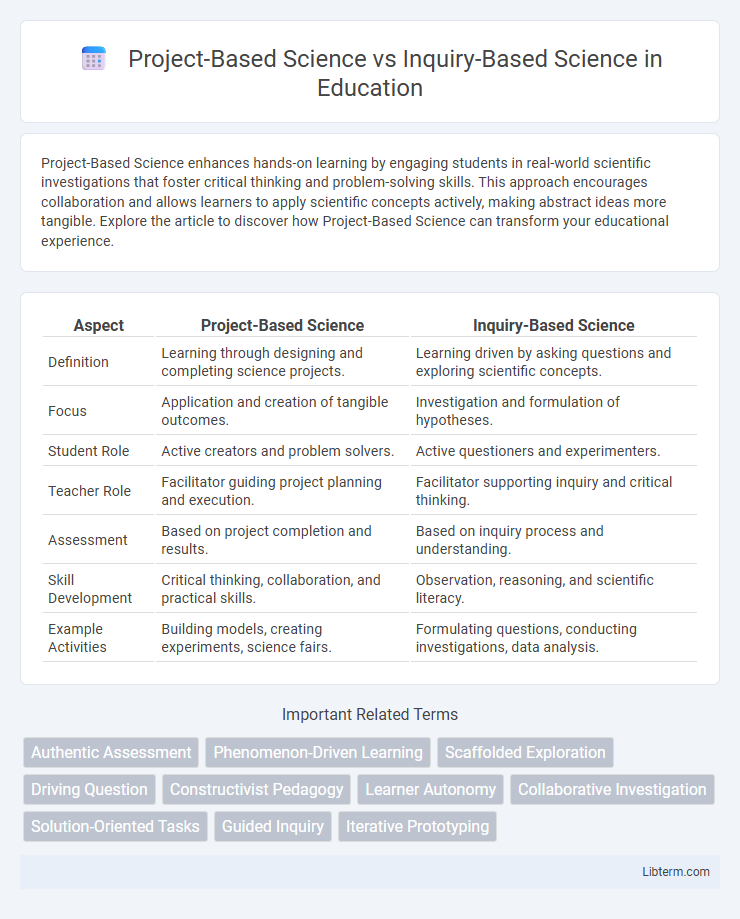Project-Based Science enhances hands-on learning by engaging students in real-world scientific investigations that foster critical thinking and problem-solving skills. This approach encourages collaboration and allows learners to apply scientific concepts actively, making abstract ideas more tangible. Explore the article to discover how Project-Based Science can transform your educational experience.
Table of Comparison
| Aspect | Project-Based Science | Inquiry-Based Science |
|---|---|---|
| Definition | Learning through designing and completing science projects. | Learning driven by asking questions and exploring scientific concepts. |
| Focus | Application and creation of tangible outcomes. | Investigation and formulation of hypotheses. |
| Student Role | Active creators and problem solvers. | Active questioners and experimenters. |
| Teacher Role | Facilitator guiding project planning and execution. | Facilitator supporting inquiry and critical thinking. |
| Assessment | Based on project completion and results. | Based on inquiry process and understanding. |
| Skill Development | Critical thinking, collaboration, and practical skills. | Observation, reasoning, and scientific literacy. |
| Example Activities | Building models, creating experiments, science fairs. | Formulating questions, conducting investigations, data analysis. |
Understanding Project-Based Science
Project-Based Science (PBS) emphasizes hands-on learning through extended projects that integrate multiple scientific concepts and real-world applications, fostering deeper understanding and skill development. This approach encourages students to actively investigate and solve complex problems by designing experiments, analyzing data, and presenting findings, promoting collaboration and critical thinking. PBS contrasts with Inquiry-Based Science by providing structured, goal-oriented tasks that connect scientific theories with practical outcomes, enhancing student engagement and retention of knowledge.
Defining Inquiry-Based Science
Inquiry-Based Science emphasizes student-driven questioning, investigation, and discovery, allowing learners to explore scientific concepts through hands-on experiments and critical thinking. This approach fosters deeper understanding by encouraging curiosity and the scientific method, where students formulate hypotheses, collect data, and draw conclusions. Unlike Project-Based Science, which centers on completing specific projects, Inquiry-Based Science prioritizes the process of inquiry as the core learning experience.
Key Principles of Project-Based Science
Project-Based Science centers on key principles such as engaging students in extended investigations that address real-world problems, fostering collaboration and critical thinking through hands-on activities. This approach emphasizes integration of cross-disciplinary knowledge, continuous assessment, and reflection to deepen understanding and promote retention. Students develop practical skills by designing, conducting, and presenting projects that mirror authentic scientific practices.
Core Elements of Inquiry-Based Science
Inquiry-based science emphasizes core elements such as asking questions, conducting investigations, and analyzing data to build scientific understanding. Students engage in active exploration, formulating hypotheses, designing experiments, and drawing evidence-based conclusions. This approach promotes critical thinking, deep comprehension of scientific concepts, and the development of problem-solving skills essential to scientific literacy.
Differences in Learning Objectives
Project-Based Science emphasizes applying knowledge to real-world problems by engaging students in complex, extended projects that integrate multiple disciplines and skills, fostering critical thinking and collaboration. Inquiry-Based Science focuses on developing students' investigative skills through questioning, experimentation, and data analysis, promoting understanding of scientific concepts and procedures. The core difference lies in Project-Based Science targeting practical application and interdisciplinary integration, while Inquiry-Based Science centers on mastering the scientific method and conceptual comprehension.
Classroom Implementation Strategies
Project-Based Science (PBS) classroom implementation emphasizes hands-on projects aligned with curriculum standards to foster student engagement and real-world application of scientific concepts. Inquiry-Based Science (IBS) strategies focus on guiding students through questioning, investigation, and evidence-based reasoning, promoting critical thinking and scientific inquiry skills. Effective classrooms integrate clear scaffolding, formative assessments, and collaborative learning to support diverse learners in both PBS and IBS approaches.
Assessment Methods: Project vs Inquiry
Project-Based Science assessments emphasize evaluating students' final products, presentations, and collaborative processes to measure understanding and practical application of scientific concepts. Inquiry-Based Science assessments prioritize students' ability to formulate questions, design experiments, and interpret data, focusing on critical thinking and the scientific reasoning process. Both approaches use rubrics but differ in assessing tangible outcomes versus the investigative journey.
Student Engagement and Motivation
Project-Based Science enhances student engagement and motivation by involving learners in hands-on, real-world challenges that promote active problem-solving and collaboration. Inquiry-Based Science fosters curiosity and critical thinking through open-ended questions and investigation, encouraging students to take ownership of their learning process. Both approaches increase motivation by making science relevant and interactive, but Project-Based Science often leads to higher engagement through concrete goals and tangible outcomes.
Real-World Applications and Outcomes
Project-Based Science centers on hands-on activities that simulate real-world scenarios, fostering practical problem-solving skills and tangible outcomes. Inquiry-Based Science emphasizes investigating questions through exploration and hypothesis testing, promoting critical thinking and deeper conceptual understanding. Both approaches enhance scientific literacy, but Project-Based Science often leads to more explicit real-world applications, while Inquiry-Based Science nurtures investigative skills essential for scientific inquiry.
Choosing the Right Approach for Your Classroom
Choosing between Project-Based Science and Inquiry-Based Science depends on classroom goals and student needs; Project-Based Science emphasizes real-world problem solving through collaborative projects, while Inquiry-Based Science focuses on student-led questioning and exploration to develop critical thinking. Consider curriculum objectives and available resources, as Project-Based Science often requires more time and materials, whereas Inquiry-Based Science can be more flexible and adaptable. Aligning the approach with students' learning styles and assessment methods ensures effective engagement and deeper understanding of scientific concepts.
Project-Based Science Infographic

 libterm.com
libterm.com